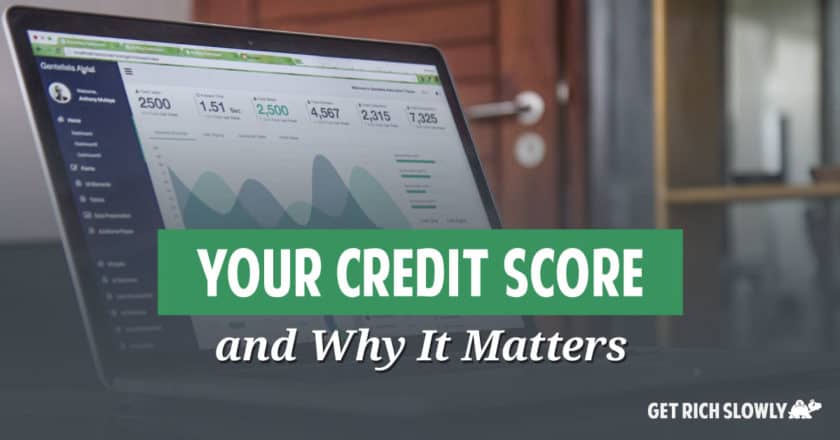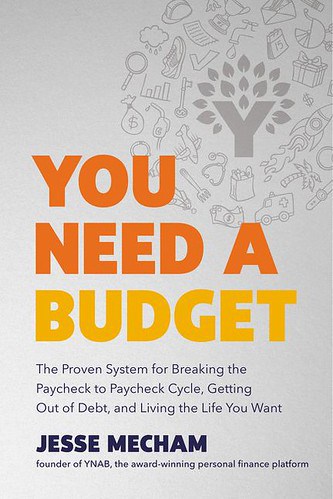Your credit score — and why it matters

For today's edition of "back to basics" month at Get Rich Slowly, we're going to talk about credit scores. What is a credit score? Why should you care?
As you go about your life, you leave a trail of transactions. You take out a mortgage, you buy a new car, you use your credit card to buy new clothes and your debit car to purchase groceries.
Every month, your creditors -- the companies to which you owe money -- send info about your recent activity to a variety of credit reporting agencies (commonly referred to as credit bureaus). Each agency collects this info into a file called a credit report.
Becoming proactive: The number-one secret to wealth, freedom, and happiness
A few weeks ago, I cataloged the difference between successful people and unsuccessful people. Based on my reading (and personal experience), I compiled a list of 61 habits that foster wealth and success.
While writing that article, I found one critical difference was mentioned again and again. Every author and expert on the subject shared some form of the following. Generally speaking: Successful people believe they control their destiny and unsuccessful people do not.
In Secrets of the Millionaire Mind, for instance, T. Harv Eker lists seventeen ways the financial blueprints of the rich differ from those of the poor and middle-class. Number one on his list?
How to use credit cards wisely: A definitive guide
It's back to basics month at Get Rich Slowly! Today, we're going to take a l-o-n-g look at how to use credit cards wisely. Believe it or not, credit cards can be a useful tool -- so long as you don't fall into debt.

Well, credit cards are dangerous -- but they're not evil. Credit cards are a tool. Like any other tool, credit cards can be used to build or to destroy. Just as you'd treat a chainsaw with respect, you need to be careful with credit to avoid hurting yourself. If you use credit cards wisely, they can actually give you a financial edge!
Your Thrift Habits — Budgeting tips from 1948
Long-time readers know that I love old instructional films -- the kind of thing we older folks used to watch in high school. ("Play it backwards!")
Because the previous owners of Get Rich Slowly "unpublished" all of the old films I once shared, I get the joy of sharing them again with a new audience. Today, we start with a gem: "Your Thrift Habits", a film designed to teach teenagers how to budget.
Produced in 1948 by Coronet Instructional Films, this 10-minute short is filled with great advice -- and it's fun to watch too.
Which online high yield savings account is best? Updated 2021

Saving money is essential to building your net worth. Savings accounts and money market accounts are meant to hold your liquid assets or funds that you expect to use within a year. You may think, "If you've seen one high-yield savings account, you've seen them all" but, actually, higher interest rates and certain features can make one account a better choice than another.
Online High Yield Saving Account and Money Market Account Rates
As online banking has evolved, consumers can find a high yield and still hope to get the mobile and digital banking convenience they need. They're free to compare interest rates and account features in search of the best online high-yield savings account for their liquid assets.
Savings Accounts
When you want to set up an emergency fund or other savings account for short-term liquidity, an online savings account usually offers higher interest rates than many brick-and-mortar banks. In addition, online banking is much more convenient.
Book review: You Need a Budget

In a nutshell: By diligently applying four simple rules, you can move from being at the mercy of money to being a master of money.

The Mechams felt flat broke.
How to calculate your net worth (and what to do with it)
In the spirit of getting back to basics this month at Get Rich Slowly, I'm planning to publish a series of articles about the most important numbers in personal finance. Let's start by looking at how to calculate your net worth.
To measure the value of a business, companies talk about equity or "book value". Jargon, right? In personal finance, equity is known as net worth. It's exactly the same thing but on a personal level. Your net worth is an important number because it reveals how much the business of you is worth at the moment.
Still clear as mud? Maybe this definition of net worth from Wait But Why will make more sense:
How to set smart goals: What science says about getting what you want
During my two-week break, I've been working to migrate some of my old Money Boss articles to Get Rich Slowly. I thought this long piece on how to set good goals might be useful to those of you about to set goals and resolutions for 2018, so I'm publishing it today. Enjoy!
We've reached one of my favorite parts of the year: the transition from the old to the new. I like that so many of us pause during the winter to reflect on how are lives are going -- and the direction we'd like them to head.
As part of this, many folks set goals and resolutions for the coming year. Unfortunately, most of these goals and resolutions are destined to remain nothing more than dreams. Why? Because most people don't know how to set good goals.
How much does your commute cost?
While I'm not a rabid anti-car crusader, there's no doubt I think the U.S. is too car-centric. I understand the historical reasons behind our vehicle dependence -- we're a young nation with sprawling cities spread far apart -- but I also believe that if you, as an individual, make an effort to live in a walkable (or bike-able) neighborhood, you can save tons of cash while enhancing your lifestyle.
How much can you save? Well, that's tough to quantify. There are a lot of variables that go into the calculation.
The folks at Transportation Evolved, however, have made an effort to crunch the numbers. They've created a cost of commuting calculator that takes into account a wide variety of factors -- then allows you to further explore how this cost affects your true hourly wage and the opportunity cost of lost investment income.
Habits of the wealthy: What do rich people do differently?

I'm fascinated by the differences between rich people and poor people. Are the differences mostly a matter of class and economic mobility? Are people born to wealth and poverty and destined to remain there? Or are there observable differences in attitude and action that tend to lead people to specific levels of affluence?
From my experience, it's some of both.
I believe that there are absolutely systemic issues that contribute to wealth and poverty. But I also believe that there are attitudes and habits that foster wealth and success. These attitudes and habits can be learned. They can be applied to our own lives, allowing us to build better futures.
